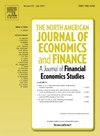加密货币和经济制裁
IF 3.9
3区 经济学
Q1 BUSINESS, FINANCE
North American Journal of Economics and Finance
Pub Date : 2025-09-05
DOI:10.1016/j.najef.2025.102537
引用次数: 0
摘要
本研究探讨了加密货币在现代战争中的作用,特别是在俄罗斯-乌克兰冲突期间。该研究利用时变参数向量自回归(TVP-VAR)模型,评估了加密货币的动态金融行为,重点关注流动性、避险状态的变化及其在规避经济制裁方面的应用。该分析区分了三个不同阶段的金融行为:冲突前、冲突和金融制裁时期,突出了加密货币与传统金融市场之间的相互作用。研究结果表明,加密货币的角色从回报和波动性溢出效应的净发送者转变为净接收者,尤其是在金融制裁阶段。这项研究为加密货币与传统金融资产的整合及其在军事冲突期间对当地经济的潜在影响提供了见解。研究结果记录了军事冲突期间加密货币的流动性和互联性的增加,并探讨了它们在逃避制裁和支持战争努力方面的潜在用途。本文章由计算机程序翻译,如有差异,请以英文原文为准。
Cryptocurrencies and economic sanctions
This study examines the role of cryptocurrencies in modern War, specifically during the Russia-Ukraine conflict. Utilizing a Time-Varying Parameter Vector Autoregression (TVP-VAR) model, the research assesses the dynamic financial behaviors of cryptocurrencies, focusing on changes in liquidity, safe haven status, and their use in circumventing economic sanctions. The analysis distinguishes financial behaviors across three distinct phases: Pre-Conflict, Conflict, and financial sanctions periods, highlighting the interaction between cryptocurrencies and traditional financial markets. The findings indicate shifts in the role of cryptocurrencies from net transmitters to net receivers of spillovers in both returns and volatility, particularly during the financial sanctions phase. This study provides insights into the integration of cryptocurrencies with traditional financial assets and their potential impact on local economies during military conflicts. The results document the increased liquidity and interconnectedness of cryptocurrencies during military conflict periods and explore their potential use in evading sanctions and supporting War efforts.
求助全文
通过发布文献求助,成功后即可免费获取论文全文。
去求助
来源期刊
CiteScore
7.30
自引率
8.30%
发文量
168
期刊介绍:
The focus of the North-American Journal of Economics and Finance is on the economics of integration of goods, services, financial markets, at both regional and global levels with the role of economic policy in that process playing an important role. Both theoretical and empirical papers are welcome. Empirical and policy-related papers that rely on data and the experiences of countries outside North America are also welcome. Papers should offer concrete lessons about the ongoing process of globalization, or policy implications about how governments, domestic or international institutions, can improve the coordination of their activities. Empirical analysis should be capable of replication. Authors of accepted papers will be encouraged to supply data and computer programs.

 求助内容:
求助内容: 应助结果提醒方式:
应助结果提醒方式:


